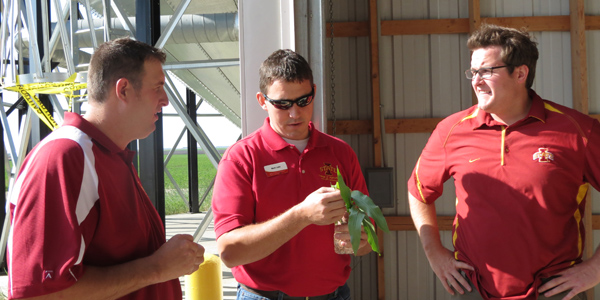
Farming Forward By Managing Micronutrients
Farmer Jim Halbur and his family are making the most of expertise offered by Iowa State University Extension and Outreach field agronomist Mark Licht. But if you ask Licht, the relationship is far from one-sided.
“Working with farmers like the Halburs allows me to see how our recommendations work in the field,” Licht says. “I also can see what further research and information is needed.”
The Halburs, who farm near Glidden, Iowa, agree. They call theirs a “symbiotic relationship.” The Halbur operation consists of Jim (‘78 farm operations),
Barb, an ISU education grad and three sons: Brian (’03 agricultural studies), Scott (’05 agricultural business and economics, MS ’06 accounting) and Jay (’08 agricultural business). Son Chad (’11 ag studies and accounting) is a lawyer in Chicago and daughter Bridget (’13 ag studies and accounting) is working on her law degree at Kansas State.
The Halbur farm produces mostly corn, but will also include soybeans this year.
“The Halburs run a modern and efficient operation,” Licht says. “They’re progressive farmers who offer insight into where farming’s going.”
Science-driven decisions
Licht first connected with Halburs several years ago when they reached out to him with questions about soil sampling.
That opened a door for discussions about micronutrients—which ones were needed on their fields, and where. Licht was able to help them pinpoint what they needed from fertilizers in order to reach a higher level of production.
“He’s like the pharmacist of soils,” Barb says.
Licht’s agronomic expertise equipped the Halburs with the knowledge necessary to make an important decision for their arm—acquiring their own on-site facili- ties for mixing and storing vital liquid chemicals and dry fertilizers.
Because of these facilities, the Halburs now have the ability to mix their own fertilizers and customize them to their fields’ current needs. This gives them optimal control for fine-tuning what goes into the soil.
Brian, who works full-time on the farm and makes a lot of the management decisions, says Licht helps him decide “which products to use, how much to use and what’s going to pay back.”
“Every decision always starts with agronomics,” Licht says. Basic knowledge of soil fertility helps guide the Halburs when they make big decisions.
“Fertilizer technology has changed,” Brian says. “They’re starting to stack a lot more nutrients on a pellet or a granule. You have to make sure that the value is there. Mark and I work quite a bit on trying to back-figure to the base ingredi- ents, because you can buy the same base ingredients that are on the granule.”
Buying fertilizer ingredients in bulk not only helps fine-tune soil fertility— it also saves money. The same goes for micronutrients like sulfur and zinc, which Licht has identified as desirable for improving soil fertility on the Halbur farm. Elemental sulfur is more stable in the soil after it has been applied. Instead of using elemental sulfur, the Halburs have used their environmentally safe facilities to mix ammonium thiosulfate, which they’ll use in the meantime while building sulfur levels in the soil with elemental sulfur. They also have mixed and applied ammo-niated zinc.
It’s paid off.
“Both those facilities are expensive, but the savings going to this ammonium thiosulfate and ammoniated zinc while you bridge the gap is such a huge amount that it pays for the installation of the system and beyond,” Brian says.
Spirit of independence
The spot of land where the sleek, metal facilities for bulk chemicals and dry fertilizer stand also hosts grain storage and drying facilities.
The high standards the Halburs maintain at their grain facilities enable them to sell their corn to specialty processors.
“Being able to store it and dry it ourselves results in a higher test weight and a cleaner product,” Jay says.
Storing their own grain also helps the Halburs maintain their independence.
Instead of having to rely on a third party to store their grain, the family has complete control over their own product.
“A big theory on this farm is: direct from the manufacturer, direct to the end user,” Jim says.
This independent spirit is certainly a running theme in the Halburs’ life, and it’s one of the things that keeps them on the agricultural forefront. It also puts ISU Extension and Outreach in a position to be extremely valuable to the Halburs’ operation.
“The university provides independent research that checks the performance of products,” Scott says. “Extension provides agronomic advice about that research, how products work and changes in the industry.”
Licht connects the Halburs to other Iowa State researchers who offer different expertise as needed. And, he connects the family with international guests— farmers from countries like Ukraine and Brazil—who want a look at farming in the United States. That helps Licht provide an advanced view of Iowa agriculture to groups he hosts and allows the Halburs to showcase their operation and visit with farmers from around the world.



